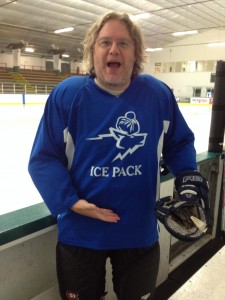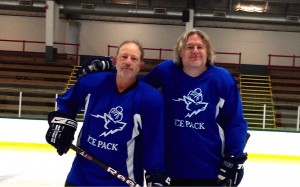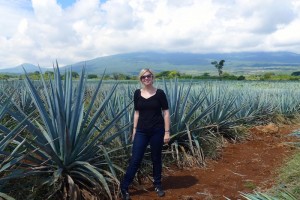When not teaching, researching or writing, for the past three years UVM historians Steve Zdatny and Sean Stilwell play hockey. Their first year playing was rough. Why? Although Professor Stilwell grew up in the Canadian prairies, he hadn’t skated in 30 years. Professor Zdatny had likewise been off the ice for decades. Their team – the Ice Pack – lost every game. The next year, however, the Ice Pack went undefeated and won the league championship. Professor Stilwell, who specializes in West African history and plays left wing, compensates for (much) less than elegant skating by being just mean / dirty / lucky enough in front of the net to score goals. Professor Zdatny, who focuses Modern French history and plays defense, isn’t as quick as he once was, but manages to regularly shut down opponents at the blue line via a combination of guile and good fortune. Both agree that the stresses of academic life can best be worked out on the ice. Professors Stilwell and Zdatny are hoping someday to recruit an all History Department hockey team, although their efforts to do so have not yet proved fruitful. Off the ice, Professor Stilwell has just published a history of slavery in Africa – Slavery and Slaving in African History (Cambridge University Press, 2014) – and Professor Zdatny is completing his fourth book, a history of hygiene in Modern France.
Hi All,
Please see the message below from history department professor Jonathan Huener about the first public lecture of the academic year sponsored by the Center for Holocaust Studies:
"Our first public event of the current semester will feature Professor Peter Hoffmann of McGill University. Professor Hoffmann is an internationally-acclaimed expert on the German resistance in the Nazi era, and will be speaking on "The German Resistance to Hitler and the Persecution of the Jews." The lecture, sponsored by the Kinsler Endowment for Holocaust Studies, will take place on Monday, 15 September, at 7:00 p.m. in Room 338 (Memorial Lounge) of the Waterman Building. We hope to see you there!" I hope that all readers will consider attending! Paul Deslandes
Posted in Upcoming Lectures | Leave a Comment »
Periodically, I’ll be posting links to this blog that reveal that history is still very much in the the news and extremely relevant to our high-tech contemporary lives. A recent controversy about the nature of the AP U.S. History curriculum reminds us of this. I think it’s interesting to note how presentations of the past can generate such strong feelings. It’s a good reminder of why we should be paying attention to how the study of past enters public discourse.
For more details see the following link:New History Wars
Posted in from the chair, Links | Leave a Comment »
In case you think we only study, write papers and books, or teach, I wanted to also share a photo from our recent graduate student/faculty BBQ. We’re hoping to do more social events in the year to come for undergraduate and graduate students alike.
Posted in from the chair | Leave a Comment »
Hi again,
The history department, in the conjunction with the James Marsh Professor-at-Large Program at UVM, is very proud to be sponsoring a lecture on Monday, September 8th by Professor T. H. Breen of Northwestern University.
The title of Professor Breen’s lecture is “Washington’s Political Genius: Performing the New Government for the People”. This lecture will be delivered at 4:00 P.M. in the Silver Maple Room on the 4th Floor of the Davis Center. A reception will follow the lecture.
We hope that all who can will join us. For more details, see the following link: Breen Lectures
Paul Deslandes
Chair, Department of History
Posted in Upcoming Lectures | Leave a Comment »
Hi History Folks,
One wouldn’t know that we’re moving into the second week of September with the weather we’re having here in Burlington this week but, heat aside, the start of the semester is off to a very fine start in the Department of History. Our classes are full, our students and faculty seem energized, and the campus is abuzz with bright minds and eager faces.
As always, I find it hard to keep up with the work of my colleagues, who seem to be generating new publications at a rapid pace. Today, I want to draw your attention to Sean Stilwell’s most recent book, titled Slavery and Slaving in African History. This study, part of Cambridge University Press’s “New Approaches to African History” provides a comprehensive history of slavery in Africa from the earliest times to the end of the twentieth century. Building on his own research expertise in West African history, Stilwell has produced a wonderfully readable text that not only introduces readers to the types of slavery that existed in Africa but also to the experiences of enslaved peoples and key debates in this enormously vibrant field of history.
For further details on this exciting new publication see the following link: Stilwell Book on Slavery
Best wishes,
Paul Deslandes
Posted in from the chair | Leave a Comment »
“Five Questions With…” will be a monthly feature on our blog that profiles a member of the UVM history department. To request a profile of a particular history department professor or staff member, or to submit questions for consideration for particular professors, please email history@uvm.edu with the subject line “Five Questions.”
This month, we are chatting with Assistant Professor Sarah Osten. Professor Osten came to UVM last fall. Previously, she was a postdoctoral fellow and then a visiting assistant professor at Northwestern University in Evanston, IL. She earned her PhD from the University of Chicago in 2010. She is originally from the Boston area.
What made you want to become an historian?
I’ve always been really interested in history from the time I was very young, but it took me a while to decide to pursue history as a career. My original plan after college was to go to graduate school in law or political science, focusing on Latin America. But over time, I realized that the questions that most interested me about politics were almost always historical ones, and that historians had written most of my favorite books about Latin America. I also discovered that I love doing archival research.
Why Mexican history? What is your connection to Mexico?
I studied abroad in Puebla, Mexico as an undergraduate and I’ve been smitten and fascinated with Mexico from that point onward. Mexico is not my own country, but in many ways it has become a second home to me over the years. Aside from my personal connection to Mexico and my own passion for Mexican history, I think it’s really important for more people in the US to learn more about Mexico (and Latin America in general), and I hope that I can contribute to that in some small way with my teaching and research.
What’s the most exciting part of your current research, for you?
I am really lucky to be working with the personal papers of many of the Mexican politicians from the 1910s and 1920s that I study. What that means in practice is that I spend a lot of my time reading other people’s mail from almost a century ago. Mostly their letters are about politics during and after the Mexican Revolution, but in many cases, they also include details about their spouses, their kids, their friends. In one case, I even found out about a secret love affair. Most of that kind of personal detail won’t make it into the book I’m writing about Mexican politics in the 1920s, but these documents help me to understand who these people were and why they did some of the things they did. More importantly for writing a political history of the period, I can also track these politicians’ relationships to each other over the years.
What’s your favorite thing about teaching history?
Latin American history is something that many of my students have never studied in any depth, or at all, before they first arrive in my classroom. I really enjoy introducing students to the history of the region, and helping them to connect the dots in terms of where Latin America fits (and doesn’t fit) in their understandings of global history and politics. I also really enjoy working with students who embark on their own research projects on Latin American topics. And I am always thrilled when students go on to travel or study abroad in Latin America after taking courses with me.
What are you up to when you’re not on campus?
Weather permitting, I try to take a run along the lakefront three or four times a week. I’ve also been spending a lot of time lately engaged in an epic battle against the weeds in my garden. So far, the weeds are winning.
Posted in Five Questions With... | Leave a Comment »
The following lectures are either being sponsored by the history department or other campus organizations that have substantial participation by history faculty and students. Consider this a “save-the-date” message. Further details will follow:
* Thursday, September 4, 5:30 PM, Special Collections Reading Room Bailey/Howe Library, John Duffy and H. Nicholas Muller III, “Inventing Ethan Allen.”
*Monday, September 8, 4:00, PM, Silver Maple Ballroom, Davis Center, Timothy H. Breen, Northwestern University and UVM James Marsh Professor at Large, “Washington’s Political Genius: Performing the New Government for the People.” (part 1 of a 3-part lecture series)
* Monday, September 15, 7:00 PM, Waterman Memorial Lounge (Room 338), Peter Hoffmann, McGill University: “The German Resistance to Hitler and the Persecution of the Jews.”
* Thursday, September 18, 5:30 PM, Billings North Lounge, Alan Taylor, University of Virginia, “The Internal Enemy: Slavery and War in Virginia, 1772-1832.”
* Thursday, September 25, 4:00 PM, Silver Maple Ballroom, Davis Center, Timothy H. Breen, Northwestern University and UVM James Marsh Professor at Large, “Washington’s Mission:Countering Arguments for State Sovereignty.” (part 2 of 3-part series)
* Thursday, Oct. 9, 6:00 PM, Fleming Museum 101, Renate Blumenfeld-Koskinski, University of Pittsburgh,“Roles for Women in Colonial Fantasies of Fourteenth-Century France: Pierre Dubois and Philippe de Mézières.”
*Monday, October 13, 4:00 PM, Sumathi Ramaswamy, Duke University, will be presenting on her work on the visual culture of South Asia. Details TBA.
* Monday, 27 October, (perhaps at lunch time), Professor Erika Rappaport (UC-Santa Barbara), discussing her work on tea and tea consumption in the British Empire. Details TBA.
* Monday, 27 October 27, 7:00 PM, Waterman Memorial Lounge (Room 338) (The Raul Hilberg Memorial Lecture) David Cesarani, Royal Holloway College, London: “The Nazis, their Wars, and the Fate of the Jews, 1938-1945.”
* Monday, November 3, 2014, 7:00 PM, Waterman Memorial Lounge (Room 338), Wendy Lower, Claremont-McKenna College: “Hitler’s Furies: German Women in the Nazi Killing Fields.”
Also:
The Vermont Humanities Council is having its Fall conference at UVM (in the Davis Center), on the topic “A Fire Never Extinguished: How the Civil War Continues to Shape Civic and Cultural Life in America,” Nov. 14-15. Several eminent historians are among the featured speakers.
Posted in Upcoming Lectures | Leave a Comment »
Hi Students, Faculty, Staff, Alumni, and Friends,
While I’ve been posting to this blog recently, this will serve as my official welcome to the 2014-2015 Academic Year. The history department is back in full swing. Faculty and students have returned from productive and interesting summers. Many members of our highly productive faculty traveled over the past few months to deliver papers, conduct archival research, and teach in study abroad programs. Among the countries visited were Poland, Mexico, Germany, the United Kingdom, Japan, Nepal, Turkey, and Canada. Of course, those members of the faculty who work on the history of the United States also visited archives and libraries in New York, Boston, Montpelier, and Washington D.C. Those of us who teach in the department were not the only ones to rack up frequent flyer points this summer. Students in the department traveled around the globe to study languages, conduct research, and perform community service.
During the fall semester the department is offering its usual broad array of courses on topics ranging from the history of China and Japan and environmental history at the introductory level to advanced seminars on slavery in western societies and France under German occupation. As always, these classes are not only full of interesting and innovative content but also focused on providing students with broadly applicable critical thinking and reading skills as well as specific guidance on approaches to research and writing.
Over the coming weeks and months, you should look to this blog for postings about upcoming events in the history department but also for information about careers for historians, interesting articles about the discipline and world events, and reminders about important milestones in the academic year.
Additionally, content on this blog will also include:
–Faculty and Student Profiles
–Featured Documents, Images, and Films
–Interesting Archival Finds
–Faculty and Student Research
–Community Events
As chair of the department, I am also interested in hearing your thoughts about what kind of content you’d like to see on our website. Feel free to e-mail me at paul.deslandes@uvm.edu or at history@uvm.edu.
Best wishes to you all for a productive and enjoyable fall.
Paul R. Deslandes (History Department Chair)
Posted in from the chair | Leave a Comment »
Hi History Fans,
I’ll be posting a longer, and more formal, “Welcome to the Academic Year” message later today but, before I do that, I wanted to pass along the following interesting article. While people committed to humanistic inquiry sometimes feel under attack, evidence on the value of history (and other humanities disciplines) abounds in a variety of settings. For every crank who questions the value of the humanities, there are ten supporters who show us, again and again, why the humanities (and particularly history) matter. One needn’t look very far these days (Washington, D.C., Russia, Ukraine, Syria, Iraq, Liberia, etc t0 mention but a few places) where the value of historical knowledge and the importance of historical thinking skills are readily apparent. I would encourage you to think of this as you read the following article by Adam Gopnik. Enjoy and contemplate!!!!!!
Posted in from the chair, Links | Leave a Comment »




